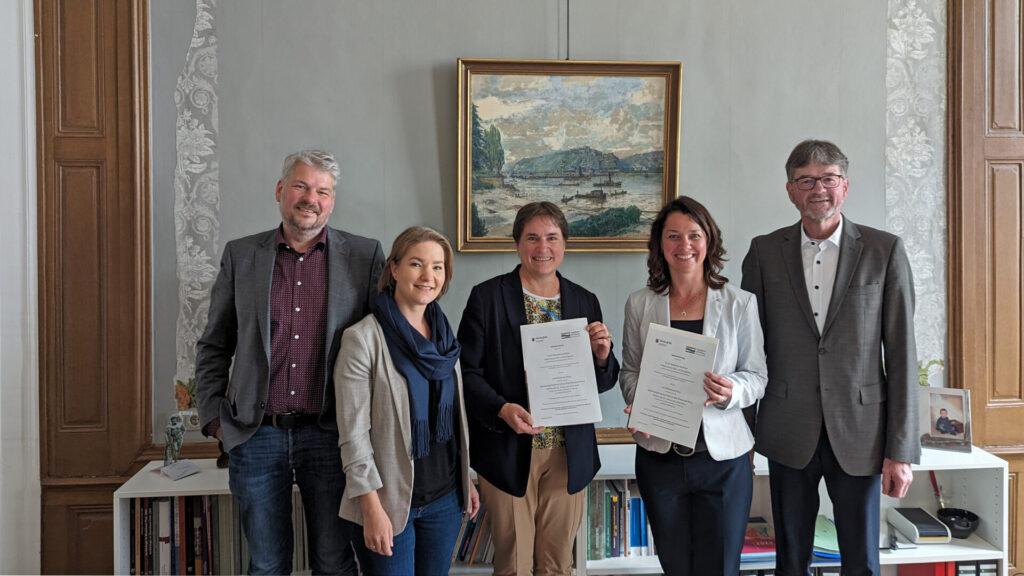Dr Heike Otto and Mayor Eveline Breyer sign new framework agreement
17.06.2024: The city of Ingelheim and the state of Rhineland-Palatinate have reached a new agreement on the joint research and preservation of cultural heritage. The framework agreement signed in Mainz on Monday continues the highly successful cooperation between the state’s Directorate-General for Cultural Heritage (GDKE) and the Kaiserpfalz Ingelheim research centre, which has been in place since 2009, and expands its content.
In January 2009, the then Mayor of Ingelheim, Dr Joachim Gerhard, and the then State Secretary in the Ministry of Education, Science, Youth and Culture, Prof. Dr Joachim Hofmann-Göttig, signed the cooperation between the state’s highest monument protection authority and the town in Ingelheim. This initial agreement has now been replaced by a joint project signed by Dr Heike Otto, Director General of the GDKE, and Mayor Eveline Breyer.
In the past, the main focus of Ingelheim’s contribution was to develop media-based educational programmes for various cultural monuments in Rhineland-Palatinate. The research centre had already provided important impetus in this area since the early 2000s with innovative, digital offerings for making the Imperial Palace ruins accessible to the public. It brought this expertise to important monuments such as Trifels Castle and Pfalzgrafenstein near Kaub as part of its collaboration with the GDKE. In future, the projects of the two partner institutions will be even more comprehensive and multi-layered: With the new framework agreement, the joint “exploration of cultural monuments, cultural landscapes and archaeological finds from the Late Antique and Medieval periods” has been agreed.
“The renewed cooperation with the state confirms how valuable and professional the contribution of the research centre and its employees has been in many joint projects over the last 15 years,” emphasised Mayor and Head of Cultural Affairs Eveline Breyer on the occasion of the signing at the Erthaler Hof in Mainz. “I am therefore very pleased that we as the city of Ingelheim, with our specialist archaeological department, will be able to continue to contribute to researching and preserving the cultural heritage of the state and communicating its significance to the people – as has been successfully implemented in Ingelheim for years,” Eveline Breyer continued.
Dr Heike Otto, Director General of Cultural Heritage Rhineland-Palatinate, is delighted with the positive cooperation with the city of Ingelheim: “By signing this framework agreement, the city of Ingelheim and the state of Rhineland-Palatinate are sending a strong signal for the appreciation and protection of our cultural heritage. This agreement is not only a continuation of our successful collaboration since 2009, but also an extension of our joint endeavours. It is a promise that we will continue to work side by side to explore and preserve our rich cultural heritage.”
Ingelheim expertise for the Worms World Heritage Site
The research centre in Worms is currently working for the GDKE’s State Archaeology Department: in 2020, the archaeologists began the scientific evaluation of an excavation in the cathedral district, and since April 2021 the focus has been on the synagogue district of Worms. In addition to the archaeological excavations in the area of the mikvah, a high medieval Jewish ritual bath, the focus was on participating in a research colloquium to investigate structural damage to the monument and preparing reports for the World Heritage Commission of ICOMOS (International Council on Monuments and Sites). In November 2023, the preliminary results were presented to a panel of experts. Based on the numerous datable findings in the synagogue district, an overall scientific evaluation is to be prepared in the coming years. At the beginning of April, the GDKE and the town of Ingelheim signed a separate agreement with the aim of continuing the archaeological and architectural-historical investigation of the mikvah and “to create the basis for the reconstruction of the construction history of the mikvah of a high medieval Jewish cult district for the mutual benefit of the GDKE and the research centre”, as the agreement states.
Innovative impulses in the field of cultural mediation
Flashback: The first joint project between the research centre and GDKE was the exhibition “The Hohenstaufen and Italy” in Mannheim in 2010/11, when the research centre contributed exhibits and also curated its own supplementary exhibition in the Ingelheim hall church. With the “Vinum Friderici”, the research centre and Ingelheim winegrowers also created a wine from grapes from the town’s oldest vineyards, which was presented in Mannheim.
Since then, the cooperation has been brought to life in numerous other projects. The research centre has worked closely with the Directorate of Castles – Palaces – Antiquities (BSA) of the GDKE, providing its expertise, for example expertise during archaeological excavations at the Templar Chapel in Hof Iben (2012/13) and supported the redesign of the exhibition at Villa Ludwigshöhe in 2017 Employees from the research centre also developed and designed an audio guide for Pfalzgrafenstein Castle near Kaub (2014/15) and took part in various projects at the state exhibition “The Emperors and the Pillars of their Power” in the Corona year 2020. Among other things, a hologram showcase was created, which has since enriched the presentation at Trifels Castle.
Ingelheim has also benefited greatly from the cooperation with the state since 2009. With Charlemagne’s palace, the town has a monument of outstanding importance, which is also one of the best-preserved palaces of the Middle Ages. Participation in state-wide exhibitions in collaboration with the GDKE, such as “Prehistoric Times” in 2017 or “The Emperors and the Pillars of their Power” in 2020, have helped Ingelheim’s cultural heritage to appear on the big stage. The cooperation that has now been continued should prove to be very fruitful for everyone involved in the coming years.
